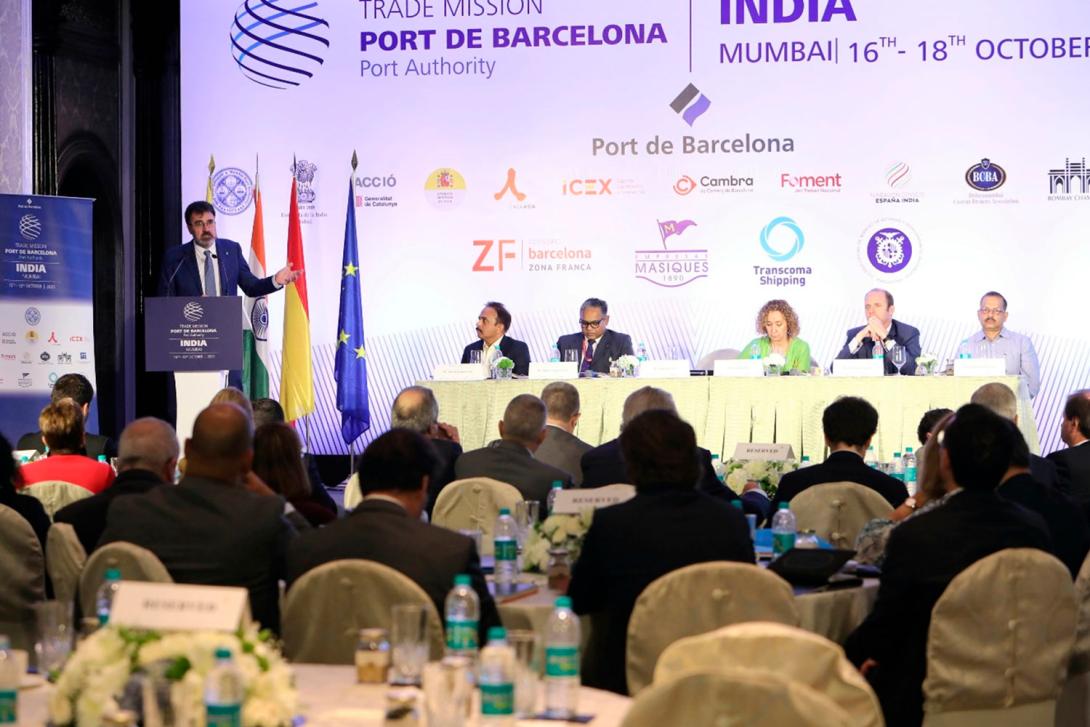The Port of Barcelona introduces itself to India as a strategic ally for increasing commercial relations with Europe
The opening day of the Port of Barcelona Trade Mission brought together 120 institutional and professional representatives of transport and logistics in Mumbai.
“Because of its position as a hub for Europe and North Africa, the Port of Barcelona is also a strategic ally for helping Indian companies to access one of the largest markets in the world”, explained Lluís Salvadó.

India is already a strategic market for the Port of Barcelona, but above all it is a strategic market for Europe between now and 2030. This is explained by the country's strong institutional relations with the European Union, the extraordinary size of its internal market, and the enormous growth potential of its industrial and productive structure. But the Port of Barcelona's position as a strategic hub for Europe and North Africa also makes it a strategic ally for helping Indian companies to access one of the largest markets in the world. And this was evident today at the opening conference of the Trade Mission that the Port of Barcelona is holding in Mumbai this week.
During this opening session, Lluís Salvadó, president of the Port of Barcelona, explained to the approximately 120 institutional representatives and transport and logistics professionals in attendance that “we want to become a strategic ally for India and its companies so that they can count on us as a secure, agile and efficient gateway into Europe.” Salvadó emphasized two of the objectives of this trip: “strengthening business and institutional relations between companies, entities, associations and organizations from both countries; and promoting strategic alliances and increasing the efficiency of logistics chains from origin to destination.”
In this connection, Carla Salvadó, Deputy Manager of Commercial and Marketing at the Port of Barcelona, summarized the four main strengths of Barcelona as a strategic logistics hub for accessing the European market: its geographical location; the concentration of logistics infrastructure in the same territory; the great connectivity of the Port, with its lower distribution costs and a smaller carbon footprint than the logistics chains that pass through northern Europe; and the presence of major industrial clusters of sectors such as fashion, chemicals, electronics or automotive. Many of these sectors are also priorities for the Indian economy.
A reference partner
The Port of Barcelona currently leads trade between Spain and India, channelling 41% of bilateral maritime trade by value of goods between both countries. In 2022, the trade in products totalled 2.3 million tonnes and 130,000 TEUs, with a value of EUR 2.3 billion. These figures represent a considerable contribution to Spain-India bilateral trade, which last year totalled EUR 4.7 billion according to data from Fernando Heredia, Consul General in Mumbai. “The Port of Barcelona is India's gateway to the world” and can act not only as an entry platform to Europe but also to North Africa and the American continent, said the consul during his speech. And he added that the east-facing Port of Barcelona and the west-facing Port of Mumbai means that they are natural allies to create beneficial connections.
This strategic importance was underscored by Ester Capella, the Regional Minister of the Territory of the Catalan Government, the Generalitat, who recalled that Catalonia is ideally placed in southern Europe to act as an international business centre, both due to the weight of its industrial sector, “currently 20% of the economy, but which we aim to increase to 25% by 2030”, and because of the world-class logistics infrastructure and the importance of its capital, Barcelona.
Future strategies
The Port of Barcelona's strategy to decarbonise its activity and boost innovation is also shared by the ports of India, as the country's representatives underscored in the opening event. Renewable energy production, equipment electrification and fostering the circular economy are just some of the work lines being promoted by Indian ports to achieve their decarbonisation goals, explained Shyam Jagannathan, Director General of Shipping of the Ministry of Ports, Shipping and Waterways. As examples of this, by 2030 the government of India plans to have electrical connections to docks in 100% of its ports and to reduce drinking water consumption by 30%. This shared strategy opens up “interesting opportunities for collaboration between India and the Port of Barcelona, both in terms of infrastructure and logistics companies”, added Shyam Jagannathan.
Anil Radhakrishnan, Board member and Chairman of Logistics Committee of the Bombay Chamber of Commerce and Industry, added that India is looking for solutions to these decarbonization and innovation challenges in the country with initiatives such as a national logistics programme, a specific one for the development of ports or a single window programme, among others.
Agreements signed in India
The signing of various collaboration agreements between Catalan and Indian associations also took place today in Mumbai. On the one hand, Antonio Llobet, president of the Barcelona Customs Brokers Association, signed an agreement with the Brihanmumbai Custom Brokers Association. And Emili Sanz, president of the Association of Freight Forwarders of Barcelona (ATEIA-OLTRA), signed an agreement with the Federation of Freight Forwarders Associations in India.
Eduard Rodés, director of the European School-Intermodal Transport, signed an agreement with this latter entity to respond to the need to build better trained, qualified and digitalized port communities to improve trade relations between Spain and India and make transactions more efficient and fruitful. Rodés plans to hold meetings tomorrow with various organisations to expand this agreement into other areas related to the logistics and port sector.



